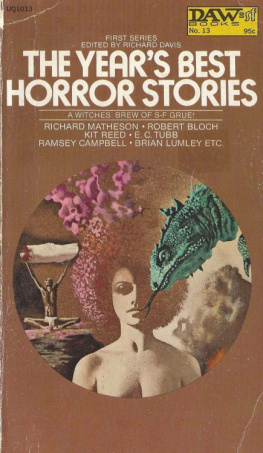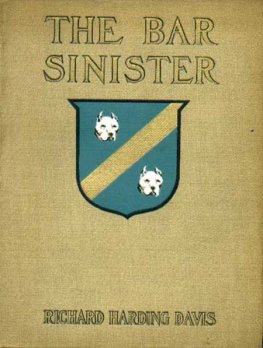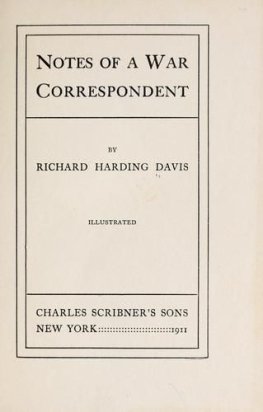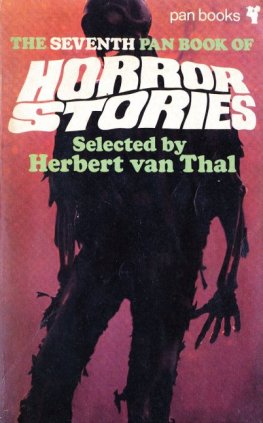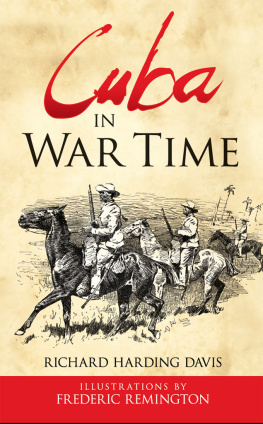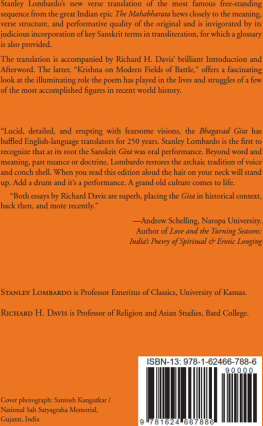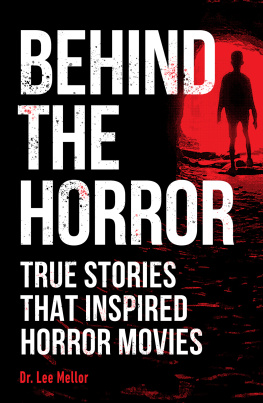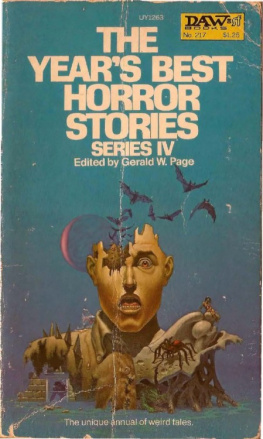Richard Davis (editor) - The Year’s Best Horror Stories 1
Here you can read online Richard Davis (editor) - The Year’s Best Horror Stories 1 full text of the book (entire story) in english for free. Download pdf and epub, get meaning, cover and reviews about this ebook. year: 1971, publisher: DAW Books, genre: Detective and thriller. Description of the work, (preface) as well as reviews are available. Best literature library LitArk.com created for fans of good reading and offers a wide selection of genres:
Romance novel
Science fiction
Adventure
Detective
Science
History
Home and family
Prose
Art
Politics
Computer
Non-fiction
Religion
Business
Children
Humor
Choose a favorite category and find really read worthwhile books. Enjoy immersion in the world of imagination, feel the emotions of the characters or learn something new for yourself, make an fascinating discovery.
- Book:The Year’s Best Horror Stories 1
- Author:
- Publisher:DAW Books
- Genre:
- Year:1971
- Rating:4 / 5
- Favourites:Add to favourites
- Your mark:
- 80
- 1
- 2
- 3
- 4
- 5
The Year’s Best Horror Stories 1: summary, description and annotation
We offer to read an annotation, description, summary or preface (depends on what the author of the book "The Year’s Best Horror Stories 1" wrote himself). If you haven't found the necessary information about the book — write in the comments, we will try to find it.
The Year’s Best Horror Stories 1 — read online for free the complete book (whole text) full work
Below is the text of the book, divided by pages. System saving the place of the last page read, allows you to conveniently read the book "The Year’s Best Horror Stories 1" online for free, without having to search again every time where you left off. Put a bookmark, and you can go to the page where you finished reading at any time.
Font size:
Interval:
Bookmark:
THE TERROR TREAT OF THE YEAR
Fourteen of the finest vintage, chilled to the last drop!
"Is it not better to do the deed before rather than after birth? We canwe muststem the tide of surplus human beings who threaten to engulf the rapidly diminishing spaces of this earth!"
What strange eyes you have, what bandaged wrists, what a lopsided left-handed look! What has become of Paul, or rather, what have you done with Paul? What lies under the bandages and behind that crooked look, which try as I may, I cannot get into proper perspectiveexcept as an image in a plate-glass door?
"My friend, you have searched in vain. For Cimmeria, or that which remains of it, encompasses all of that northeastern part of England which is your homeland. Is it not ironic? In order to find home... you have left it!"
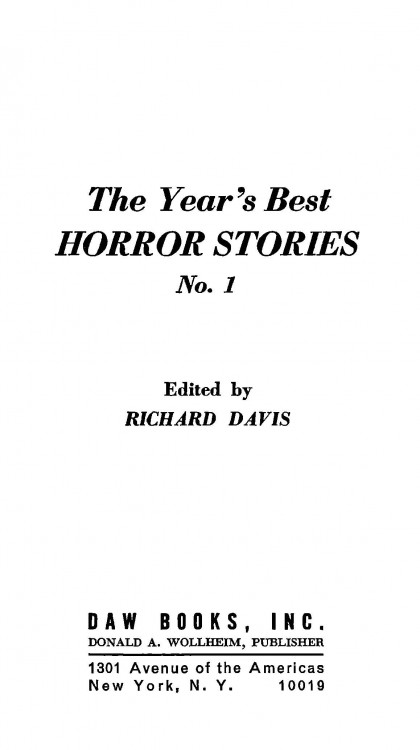
ACKNOWLEDGEMENTS
DOUBLE WHAMMY Robert Bloch, 1970. First published in FANTASTIC and reproduced by arrangement with the author's agents, Scott Meredith Literary Agency.
THE SISTER CITY Brian Lumley, 1970. First published in TALES OF THE CTHULHU MYTHOS (Arkham House, 1970) and reproduced by arrangement with the author.
WHEN MORNING COMES Elizabeth Fancett, 1969. First published in THE FIFTH GHOST BOOK, edited by Rosemary Timperley (Barrie & Jenkins 1969) and reproduced by arrangement with the publishers.
PREY Richard Matheson, 1969. First published in PLAYBOY and reproduced by arrangement with the author's agents, A. D. Peters & Co. Ltd.
WINTER Kit Reed, 1970. First published in ARGOSY and reproduced by arrangement with the author's agents, A. P. Watt & Sons.
LUCIFER E. C. Tubb, 1969. First published in VISION OF TOMORROW and reproduced by arrangement with the author's agents, Cosmos Literary Agency, Wallsend-on-Tyne.
I WONDER WHAT HE WANTED Eddy C. Bertin, 1970. First published in Spanish in LAS MEJORES HISTORIAS DE FANTASMAS (Editorial Bruguera, 1970) translated by the author and reproduced by arrangement with him.
PROBLEM CHILD Peter Oldale, 1970. First published in VISION OF TOMORROW and reproduced by arrangement with the author's agents, Cosmos Literary Agency, Wallsend-on-Tyne.
THE SCAR Ramsey Campbell, 1969. First published in STARTLING MYSTERY, STORIES and reproduced by arrangement with the author.
WARP Ralph Norton, 1968. First published in MAYFAIR and reproduced by arrangement with the author's agents, Kay Routledge Associates.
THE HATE Terri Pinckard, 1971. First published in WITCHCRAFT AND SORCERY (formerly COVEN 13) and reproduced by arrangement with the author's agents, the Ackerman Agency, Los Angeles.
A QUIET GAME Celia Fremlin, 1970. First published in ARGOSY and reproduced by arrangement with the author's agents, Anthony Sheil Associates Ltd.
AFTER NIGHTFALL David Riley, 1970. First published in WEIRD WINDOW 1970, edited by David Sutton. Reproduced by arrangement with the author.
DEATH'S DOOR Robert McNear, 1969. First published in PLAYBOY and reproduced by arrangement with the author.
Copyright , 1971, by Sphere Books Ltd.
DAW Books edition by special arrangement.
All rights reserved.
Any similarity or apparent connection between the characters in these stories and actual persons, whether alive or dead, is purely coincidental.
Cover art by Karel Thole.
PRINTED IN U.S.A.
Wickerman eBooks
Rod pulled the chicken out of the burlap bag and threw it down into the pit.
The chicken squawked and fluttered, and Rod glanced away quickly. The gaping crowd gathered around the canvas walls of the pit ignored him; now all the eyes were focussed on what was happening down below. There was a cackling, a scrabbling sound, and then a sudden sharp simultaneous intake of breath from the spectators.
Rod didn't have to look. He knew that the geek had caught the chicken.
Then the crowd began to roar. It was a strange noise, compounded of women's screams, high harsh laughter teetering on the edge of hysteria, and deep hoarse masculine murmurs of shocked dismay.
Rod knew what that sound meant, too.
The geek was biting off the chicken's head.
Rod stumbled out of the little tent, not looking back, grateful for the cool night air that fanned his sweating face. His shirt was soaked through under the cheap blazer. He'd have to change again before he went up on the outside platform to make his next pitch.
The pitch itself didn't bother him. Being a talker was his job and he was good at it; he liked conning the marks and turning the tip. Standing up there in front of the bloody banners and spieling about the Strange People always gave him his kicks, even if he was only working for a lousy mudshow that never played anywhere north of Tennessee. For three seasons straight he'd been with it, he was a pro, a real carny.
But now, all of a sudden, something was spooking him. No use kidding himself, he had to face it.
Rod was afraid of the geek.
He crossed behind the ten-in-one tent and moved in the direction of his little trailer, pulling out a handkerchief and wiping his forehead. That helped a little, but he couldn't wipe away what was inside his head. The cold, clammy fear was always there now, night and day.
Hell of it was, it didn't make sense. The Monarch of Mirth Shows had always worked "strong"out here in the old boondocks and you could still get away with murder, particularly if you were only killing chickens. And who gives a damn about chickens, anyway? The butchers chop off a million heads a day. A chicken is just a lousy bird, and a geek is just a lousy wino. A rumdum who hooks up with a carny, puts on a phoney wild-man outfit and hops around in the bottom of a canvas enclosure while the talker gives the crowd a line about this ferocious monster, half man and half beast. Then the talker throws in the chicken and the geek does his thing.
Rod shook his head, but what was inside it didn't move. It stayed there, cold and clammy and coiled up in a ball. It had been there almost ever since the beginning of this season, and now Rod was conscious that it was growing. The fear was getting bigger.
But why? He'd worked with half a dozen lushes over the past three years. Maybe biting the head off a live chicken wasn't exactly the greatest way to make a living, but if the geeks didn't mind, why should he care? And Rod knew that a geek wasn't really a monster, just a poor old futz who was down on his luck and hooked on the saucewilling to do anything, as long as he got his daily ration of popskull.
This season the geek they took on was named Mike. A quiet guy who kept out of everybody's way when he wasn't working; under the burnt-cork makeup he had the sad, wrinkled face of a man of fifty. Fifty hard years, perhaps thirty of them years of hard drinking. He never talked, just took his pint and curled up in the canvas on one of the trucks. Looking at him then, Rod was never spooked; if anything, he felt kind of sorry for the poor bastard.
It was only when the geek was in the pit that Rod felt that ball of fear uncoil. When he saw the wooly wig and the black face, the painted hands that clutched and clawedyes, and when he saw the grinning mouth open to reveal the rotting yellow teeth, ready to bite
Oh, it was getting to him all right, he was really up tight now. But nobody else knew. And nobody would know. Rod wasn't about to spill his guts to anyone here on the lot, and how would it look if he ran off to some head-shrinker and said, "Hey, Doc, help meI'm afraid I'm gonna turn into a geek." He knew better than that. No shrinker could help him, and come what may he'd never end up geeking for a living. He'd lick this thing himself; he had to, and he would just as long as no one else caught on and bugged him about it.
Next pageFont size:
Interval:
Bookmark:
Similar books «The Year’s Best Horror Stories 1»
Look at similar books to The Year’s Best Horror Stories 1. We have selected literature similar in name and meaning in the hope of providing readers with more options to find new, interesting, not yet read works.
Discussion, reviews of the book The Year’s Best Horror Stories 1 and just readers' own opinions. Leave your comments, write what you think about the work, its meaning or the main characters. Specify what exactly you liked and what you didn't like, and why you think so.

